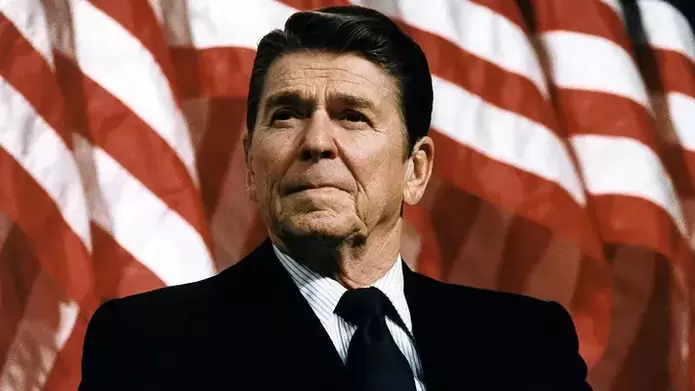|
''Reagan was the great optimist' — he also said we must 'recognize that evil exists in the world' Ronald Reagan's values, vision and vibrant personal optimism inspired a rebirth of American pride, growth and exceptionalism in the 1980s, after nearly two decades of social and cultural upheaval. "Reagan was deeply concerned about America in the late 70s," Virginia-based historian and author Craig Shirley told Fox News Digital. "America had gone through 17 long, horrible years beginning with the assassination of JFK." The quagmire of Vietnam, the author added, the failed presidency of Lyndon Johnson, the resignation of Richard Nixon, the Iran hostage crisis and the infamous social and economic "malaise" of the Jimmy Carter administration all created the feeling of a nation in decline. Reagan countered the appearance of cultural decay with pro-growth economic policies and an investment in American muscularity abroad. He also invested political capital in the nation’s spiritual rebirth: Patriotism, faith and family, individualism and the belief that the best days for America were still ahead. But the United States has changed in dramatic ways since the 1980s, namely in a massive decline in unifying religious faith — perhaps becoming a nation that Reagan wouldn’t recognize.
"Reagan was the great optimist, but I often wonder if he would still be optimistic today," biographer and Grove City College professor Paul Kengor asks. "It’s a problem of the human heart and it’s there we must look for the answer." — Ronald Reagan Reagan, scholars believed, would double down on the nation's historically unique combination of physical and spiritual strengths. "The solution … will not be found in the social worker’s files, the psychiatrist’s notes or the bureaucrat’s budgets," Reagan said. "It’s a problem of the human heart and it’s there we must look for the answer." Here’s a look at five ways Reagan’s ideals can lift the United States out of its current abyss of cultural stagnation, internal division and waning faith in itself. 1. Recognize evil exists in the world The United States and its western allies were handcuffed in the 1970s by a growing sense of moral equivalency — that constitutional republics were no better than communist tyrannies. Reagan utterly rejected the concept, most notably by calling out the Soviet Union as the Evil Empire, which he did not do for sound bites and domestic political points but for strategic purposes, Shirley noted. "He wanted to push their buttons and he wanted the world to know once and for all that the West was good and the East was evil. He saw our long twilight struggle against oligarchic collectivism as a morality play," the author said. Reagan outlined the defeat of Soviet communism in his successful 1980 campaign. It was an audacious plan at the time. The Soviet Union was essentially winning the Cold War, had recently invaded Afghanistan, had a footprint in Cuba and was on the strategic offensive. "But Reagan had the bully pulpit," said Shirley, author of several Reagan biographies, plus the upcoming 2024 release, "The Search for Reagan." "We had allies in Pope John Paul II and Margaret Thatcher, the prime minister of Great Britain, and between this and 100 other ways, the Berlin Wall eventually fell, as did the Warsaw Pact countries and eventually the Soviet Union." Shirely also said, "Calling the Soviets what they were altered the equation. From that time on, they were on the defensive. All of Reagan’s actions brought about the future collapse of the Soviet Union." 2. Have more faith in God, less faith in government Ronald Reagan often, and famously, quoted Puritan leader John Winthrop’s sermon, which proclaimed his new American settlement would become a shining "city upon a hill." The phrase, which Winthrop originally applied to Boston, eventually came to represent the entire United States. Engraving depicting General George Washington kneeling in prayer, while his soldiers camp in the background, at Valley Forge, Pennsylvania, during the winter of 1777. "Reagan often said that the beacons that lit up that ‘city upon a hill’ were faith and freedom," said Kengor, whose biographies include the 2004 book, "God and Ronald Reagan." "If you pulled away the beacon of faith, the beacon of freedom would no longer shine." Reagan drew inspiration from another early image in American history: the famous painting of Gen. George Washington kneeling in the snow in prayer during the terrible winter at Valley Forge. "He thought it was the most sublime image in American history," said Kengor. "It showed that our Founding Fathers understood that they couldn't count only on themselves, that they had to count on faith in God." Faith in God, or "the Creator" espoused in the Declaration of Independence, was seen by the Founding Fathers as a bulwark against the evil of putting too much faith in flawed fellow man, which created so much human suffering throughout all of history. "Our Constitution is designed only for a moral and religious people," President John Adams said in 1798. "It is wholly inadequate to the government of any other." Reagan summed it up eloquently in a 1984 speech in Ohio. "When men try to live in a world without God, it's only too easy for them to forget the rights that God bestows," he said. "Too easy to suppress freedom of speech, to build walls to keep their countrymen in, to jail dissidents, and to put great thinkers in mental wards." 3. Achieve peace through strength Reagan believed that a muscular military and fearless foreign policy were paths to peace, not war. He famously proposed the Strategic Defensive Initiative, dubbed "Star Wars" in March 1983. It was an ambitious initiative to weaponize space, but it tore at the Soviet Union’s fragile economy and eventually made war with the communist rival unnecessary. But Reagan made his commitment to peace through strength on the campaign trail. "Four times in my lifetime America has gone to war, bleeding the lives of its young men into the sands of beachheads, the fields of Europe and the jungles and rice paddies of Asia," he said while accepting the Republican nomination for president in 1980. "We know only too well that war comes not when the forces of freedom are strong, but when they are weak. It is then that tyrants are tempted." He added, "I would regard my election as proof that we have renewed our resolve to preserve world peace and freedom. This nation will once again be strong enough to do that." "Reagan was always looking for third ways to solve problems," said Shirley, adding the SDI was that third way of dealing with Soviet aggression. "He would set new policy. He knew [with SDI] we had the technology. We could bring down Soviet missiles without firing any of our own and thus prevent World War III from even happening." 4. Recommit to the faith and goodness of the American people Reagan believed, as the Founding Fathers did, that the enlightened individual, buoyed by faith, is the ultimate source of American greatness — and the ultimate bulwark against the tyranny of fellow man. "Faith in the dignity of the individual under God is the foundation for the whole American political experiment," Reagan said. It appears to be a faith in the everyday American lost by political leaders today, who publicly mock foundational values and even try to drive a wedge between the once protected bond of parent and child. "Faith in the dignity of the individual under God is the foundation for the whole American political experiment." — Ronald Reagan "Reagan paid tribute many times to the goodness and wisdom of the American people," said Shirley. The president testified to that faith in his inaugural address of Jan. 20, 1981. "We have every right to dream heroic dreams," said Reagan on Jan. 20, 1981. "Those who say that we’re in a time when there are no heroes don’t know where to look. You can see heroes every day going in and out of factory gates. You meet heroes across a counter. And they’re on both sides of that counter." These everyday heroes, he added, are the "individuals and families whose taxes support the government and whose voluntary gifts support church, charity, culture, art, and entertainment. Their patriotism is quiet but deep. Their values sustain our national life." "Unlike some political leaders who forgot where they came from, like Lyndon Johnson and Richard Nixon, Reagan never forgot his humble roots among the common men and woman of his country," said Shirley. 5. Recognize and rededicate ourselves to the uniqueness and fragility of the American experiment The founding of the United States and its emergence as the preeminent global superpower are, by any historic measure, miracles of societal and political evolution. The nation was born as the world’s first constitutional republic and the first nation united by universal human ideals and not united by race, ethnicity, geography or the power of monarchs and tyrants. Americans once understood that if the United States crumbles, then nations "of laws and not of men" may be lost forever. "Reagan was a student of American history, reading one book a week while president, mostly political biographies about the great people of history, especially the Founding Fathers and the Framers of the Declaration of Independence and the Constitution," said Shirley. "The American political experiment was new to all human experience," Reagan said. "If Washington had not stepped forward, first at the Constitutional Convention, then as our first elected president, we might have failed." Americans today appear to take these lessons for granted, unaware that the United States represents a great exception to previous human existence. Reagan first reminded Americans of its fragility in his 1967 inaugural speech as governor of California. "Freedom is never more than one generation away from extinction," he said. "We didn't pass it to our children in the bloodstream. It must be fought for, protected and handed on for them to do the same, or one day we will spend our sunset years telling our children and our children's children what it was once like in the United States where men were free." Kerry J. Byrne
0 Comments
Leave a Reply. |
AuthorBill Olson Archives
April 2024
Categories
All
|



 RSS Feed
RSS Feed
